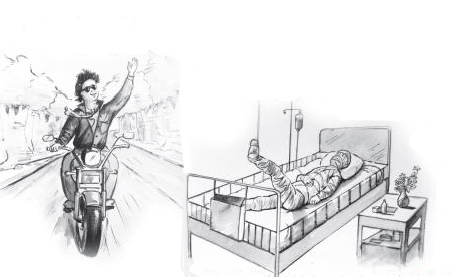Realizations from a hospital bed

I was admitted in the surgical ward of our hospital. The nursing station was very close to my bed and in close proximity to the nursing station was a small radio. It was probably there to entertain the minds of the stressed-out doctors and nursing staff. Today the radio jockey had selected the theme Jindagi ek safar: “The journey of life.” For me the word safar was resounding as “suffer.” The songs were sending out the message that life is an enjoyable journey (suhana safar)—so just enjoy it. But I had been suffering from a terrible disease for the past few days. I had an abscess and was unable to sit or walk. Every step was like a marathon and simply sitting on the office chair seemed more difficult than yogic postures.
Although the doctors and nurses were working in synchrony with the tune, I was becoming annoyed. I distinctly remembered that song and the movie. In the film, the hero sang the song while riding his bike. Even I used to sing the same song while riding my bike during my college days. But today, the same song had no effect on my burning heart, because today I was exposed to a different version of this world.
The patient on my right had an amputated limb and was screaming in pain. “O Lord! Please forgive me! Please relieve me of this pain.” On my other side was a patient of my age who was gasping. Whole day his young wife sobbed by his side. He was probably HIV positive and counting his final days. I tried to see the world though his eyes. Will any movie or song relieve his pain today? Will any food-stuff cause his mouth to water? Will any worldly pleasure please him today? Did he ever contemplate that AIDS will melt his body to a skelton covered just by skin? I, too, had never imagined that I would be lying in midst of suffering souls.
This world of suffering is completely different from the way it is advertised, just as a product is different from its advertisement. In our regular advertisements we see a nice, healthy couple with a son and daughter staying in a well-painted home with healthy grandparents. If these hoardings reflect the healthy world, then why do we need the hospitals? We also see youngsters drinking cola, driving bikes and flirting around in the advertisements. But are they not aware that they are going to end up in hospital bed one day?
Nobody has time to introspect because there are no hoardings that show the suffering of a cancer or an AIDS patient. Death is not a topic to be discussed until it is seen on the horizon of our life. If we don’t discuss this, is there any chance we will find a solution to this?
People ask, “Can you escape death on the power of your devotion?” True, devotees cannot escape death, but they can tolerate the pain that comes with it. The pain at the time of death is due to two reasons: one is the disease, and second is the terrible feeling of getting separated from the body to which we are so attached. The pain of the disease is alleviated by those who rise above the bodily concept to realize that they are eternal souls. The pain of the attachment to the body and the relatives can be conquered by getting attached to God, Krishna.
If God comes before us in the form of death and proposes that we leave this place and join Him in the spiritual sky, most likely we will refuse. But when a boy proposes to his beloved to leave her place and elope with him, she quits everything in a second. This is because of love. Similarly when same love for Krishna arises in our heart, we will be ready to go with Him anytime He comes. Then instead of being always scared in anticipation, we will eagerly await this reunion.
Yugavatara Dasa is a Associate Professor in Anatomy in a medical college in Mumbai. He is a regular contributor to BTG.
